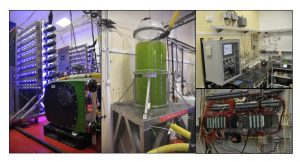Laboratorio Biogeoquimica Marina


Su principal línea de trabajo se centra en el estudio de la influencia de los procesos diagenéticos de la materia orgánica sobre los ciclos del C, N, P y Si en los sistemas marinos. Posee una amplia experiencia en la caracterización de las rutas de oxidación de la materia orgánica en sedimentos superficiales, así como en la cuantificación del intercambio de especies a través de la interfase agua-sedimento. Presta una atención especial al conocimiento de la dinámica de gases con efecto invernadero (CO2, CH4 y N2O) y al papel que ejercen los sistemas costeros como fuente o sumidero de estos gases.
Otra de sus líneas tiene por objeto evaluar la capacidad de captación de las microalgas marinas de gases industriales (CO2, NO y NO2). Para ello dispone de fotobiorreactores a escala piloto altamente automatizados que permiten una monitorización en continuo de las entradas y salidas de gases, así como de las condiciones en que se desarrollan los cultivos.

